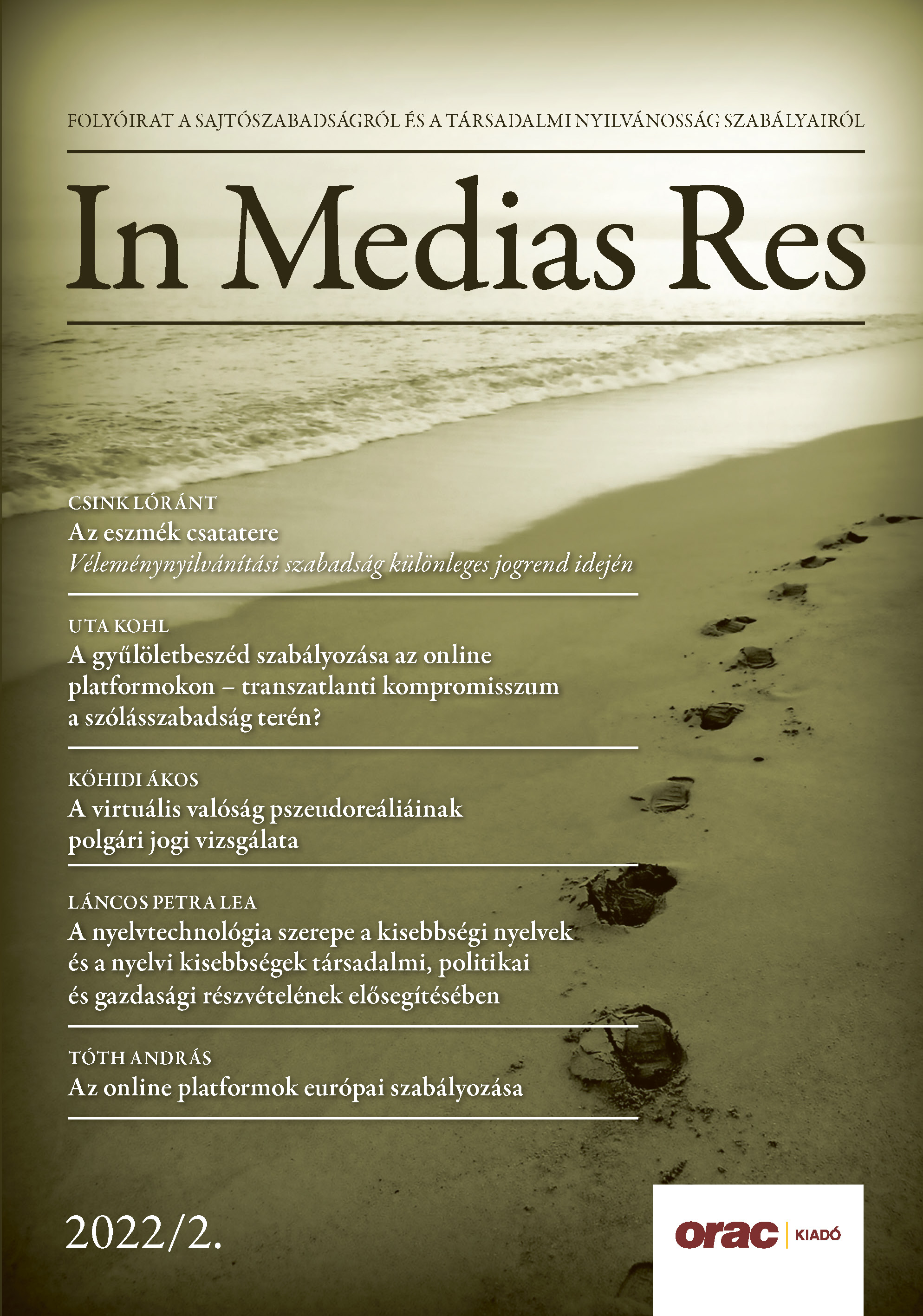Current legal assessment of anonymous commenting based on the practice of the European Court of Human Rights and the Australian Supreme Court
DOI:
https://doi.org/10.59851/imr.11.2.10Keywords:
comment, anonymous, European Court of Human Rights, Australian Supreme Court, liability, content providerAbstract
Anonymous expression has been around since the beginning of the internet. Although many people initially saw it as a positive thing, the legal, social, political and sociological problems associated with it are now clear. The present paper deals with the legal status of content that users attach to content published by traditional content providers, typically in the form of comments. These mainly contribute to developing a culture of debate on the Internet, to the common discussion of issues of interest to a wide range of people, and thus to the normal functioning of a democratic society. Still, in many cases, they also raise several legal problems. The paper compares the case law of the European supranational human rights adjudicatory forum and the Australian Supreme Court, seeking to answer the question of whether different legal cultures have different views on similar regulatory issues.
References
Alexandre De Streel et al.: Online platforms' moderation of illegal content online. Law, practices and options for reform. Study for the Committee on Internal Market and Consumer Protection, Policy Department for Economic, Scientific and Quality of Life Policies. Luxembourg, European Parliament, 2020, 10.
Amber Robinson: Banning anonymous comments won't make the internet better. Mumbrella, 2019. július 1., https://bit.ly/3fLEosh.
Andrew Hii et al.: NSW Court of Appeal confirms media companies liable as publishers of defamatory Facebook comments by third parties. gtlaw, 2020. június 3., https://bit.ly/3zXA14g.
Bartóki-Gönczy Balázs - Koltay András - Papp János Tamás - Sorbán Kinga: Általános kérdések - Áttekintés. In Czékmann Zsolt - Barzó Tímea - Csák Csilla (szerk.): "Gondolatok köztere." A közösségi média személyiségvédelemmel összefüggő kihívásai és szabályozása az egyes államokban. Miskolc, Miskolci Egyetemi Kiadó, 2021, 33.
Bissera Zankova - Gergely Gosztonyi: Quo vadis, European's Union new digital regulation package? Business and Law, 2021/2., 76.
Deák Izabella: Ki felel a kommentekért? A Delfi AS kontra Észtország-ügy. Közjogi Szemle, 2015/3., 56-59.
Dirk Vorhoof: European Court of Human Rights: Standard Verlagsgesellschaft mbH v. Austria (No. 3). IRIS, 2022/2., 1.
Emmanuel Derieux: Responsabilité d'un portail d'actualités du fait de commentaires diffamatoires postés par des internautes. Revue Lamy droit de l'immatériel. 118 (2015) 26-29.
Frédéric Krenc - Sébastien van Drooghenroeck: Chronique de jurisprudence de la Cour européenne des droits de l'homme. 134(39) Journal des tribunaux (2015) 821.
Gergely Gosztonyi: Early regulation of social media liability issues in the United States and the European Union. Jogtörténeti Szemle, 2021. különszám, 22-23.
Gergely Gosztonyi: Special models of internet and content regulation in China and Russia. ELTE Law Journal, 2021/2., 86-99., https://doi.org/10.54148/ELTELJ.2021.2.87
Gosztonyi Gergely: Cenzúra Arisztotelésztől a Facebookig. A közösségi média tartalomszabályozási gyakorlatának komplexitása. Budapest, Gondolat, 2022, 187., https://doi.org/10.24362/cenzura.gosztonyi.2022
Gyetván Dorina: Az általános nyomon követési kötelezettség mint a közvetítő szolgáltatók felelősségének jövője? In Fazekas Marianna (szerk.): Jogi tanulmányok 2021. Budapest, ELTE ÁJK Állam- és Jogtudományi Doktori Iskola, 2021, 299-315.
Jan Oster: European and International Media Law. Cambridge, Cambridge University Press, 2017, 234-236.
Jan Oster: Media Freedom as a Fundamental Right. Cambridge, Cambridge University Press, 2015, 123-124., https://doi.org/10.1017/CBO9781316162736
Jillian C. York: The right to anonymity is vital to free expression: Now and always. EFF, 2020. március 25., https://bit.ly/3DVQcjF.
John Steedman: It's time for publishers to stamp out anonymous trolling, the coward punches of public debate. Mumbrella, 2019. június 26., https://bit.ly/3fQPV9C.
Judith Townend: Freedom of expression and the chilling effect. In Howard Tumber - Silvio Waisbord (szerk.): The Routledge Companion to Media and Human Rights. New York, Routledge, 2017, 73-82., https://doi.org/10.4324/9781315619835-7
Report of the Special Rapporteur on the Promotion and Protection of the Right to Freedom of Opinion and Expression. 2011, UN Doc A/HRC/17/27, 26., 28.
Kinga Sorbán: Ethical and legal implications of using AI-powered recommendation systems in streaming services. Információs Társadalom, 2021/2., 65-67., https://doi.org/10.22503/inftars.XXI.2021.2.5
Laura Garcia Varga: Do they want to regulate online profiling? 15(1) Canadian Journal of Law and Technology (2017) 69-84.
Trine Baumbach: Chilling effect as a European Court of Human Rights' concept in media law cases. 6(1) Bergen Journal of Criminal Law and Criminal Justice (2018) 92-114., https://doi.org/10.15845/bjclcj.v6i1.1555
Laurent Pech: The concept of chilling effect: Its untapped potential to better protect democracy, the rule of law, and fundamental rights in the EU. Brussels, Open Society European Policy Institute, 2021; Trine Baumbach: Chilling effect as a European Court of Human Rights' concept in media law cases. 6 (1) Bergen Journal of Criminal Law and Criminal Justice (2018) 92-114.;
Lawrence Lessig: Code 2.0. New York, Basic Books, 2006, 35.
McCabe Curwood: Court of Appeal confirms that media outlets are "publishers" of defamatory comments made on their Facebook pages by third parties. Lexology, 2020. június 2., https://bit.ly/3G13C0h.
Nádori Péter: Delfi AS v. Észtország: strasbourgi döntés a névtelen kommentekért viselt szolgáltatói felelősségről. Infokommunikáció és Jog, 56 (2013) 131-140.
Nádori Péter: Úton a tömeges internetes szólás jogi megítélésének új megközelítése felé. A strasbourgi Nagykamara ítélete a Delfi-ügyben. In Medias Res, 2019/2., 350.
Nagy Krisztina: A véleménynyilvánítás szabadsága és a kommentek. JTIblog, 2016. április 25., https://bit.ly/3NR3nqA.
Németh Zoltán: Álnév és névtelenség a kultúrában, a művészetekben és az irodalomban. Palócföld, 2015/6., 34-38.
Nicolo Zingales: Virtues and perils of anonymity. 5(3) JIPITEC (2014) 155.
Ondřej Moravec et al.: Digital Services Act proposal (social media regulation). Studia Politica Slovaca, 2021/2-3., 166-185., https://doi.org/10.31577/SPS.2021-3.5
Owen Jones: Banning anonymous social media accounts would only stifle free speech and democracy. The Guardian, 2021. október 25., https://bit.ly/3EgWfAA.
Rebekah Giles: High Court ruling in Voller defamation case puts media companies firmly in firing line. The Guardian, 2021. szeptember 8., https://bit.ly/3EhtG61.
Sasha Di Sipio: Unsocial media: How third party comments on your public Facebook page can get your company in trouble. Maddocks, 2019. július 18., https://bit.ly/3NYTfvZ.
Vincenzo Zeno-Zencovich: Anonim véleménynyilvánítás az interneten. In Medias Res, 2014/2., 290.
Zanathy Anna: "Kiberjog" vagy netikett: az internet szabályozására vonatkozó jogtörténeti elméletek. Joghistória, 2021/1-2., 44.
Downloads
Published
How to Cite
Issue
Section
License
Copyright (c) 2022 Gergely Gosztonyi, Daniella Huszár

This work is licensed under a Creative Commons Attribution 4.0 International License.


